

CAMPS FILLING UP FAST!





Registration is now open for all YMCA Summer Camps in Queens. Summer is a launchpad for the wildest adventures and the best memories. At the Y, every splash is a thrill, every moment a story, and every friendship a bond to last a lifetime. It’s a place where imaginations soar, curiosities reign, and every child discovers a summer made just for them.
WHY FUN RULES AT SUMMER CAMP:
•A place where every kid belongs
•Where friends & memories are made every day
•100+ years of awesomeness
•The Y’s caring, trained staff make for happy parents
All Queens YMCA branches are hosting open houses from 10 AM – 12 PM on MAY 10.
SIBLING DISCOUNTS AVAILABLE.


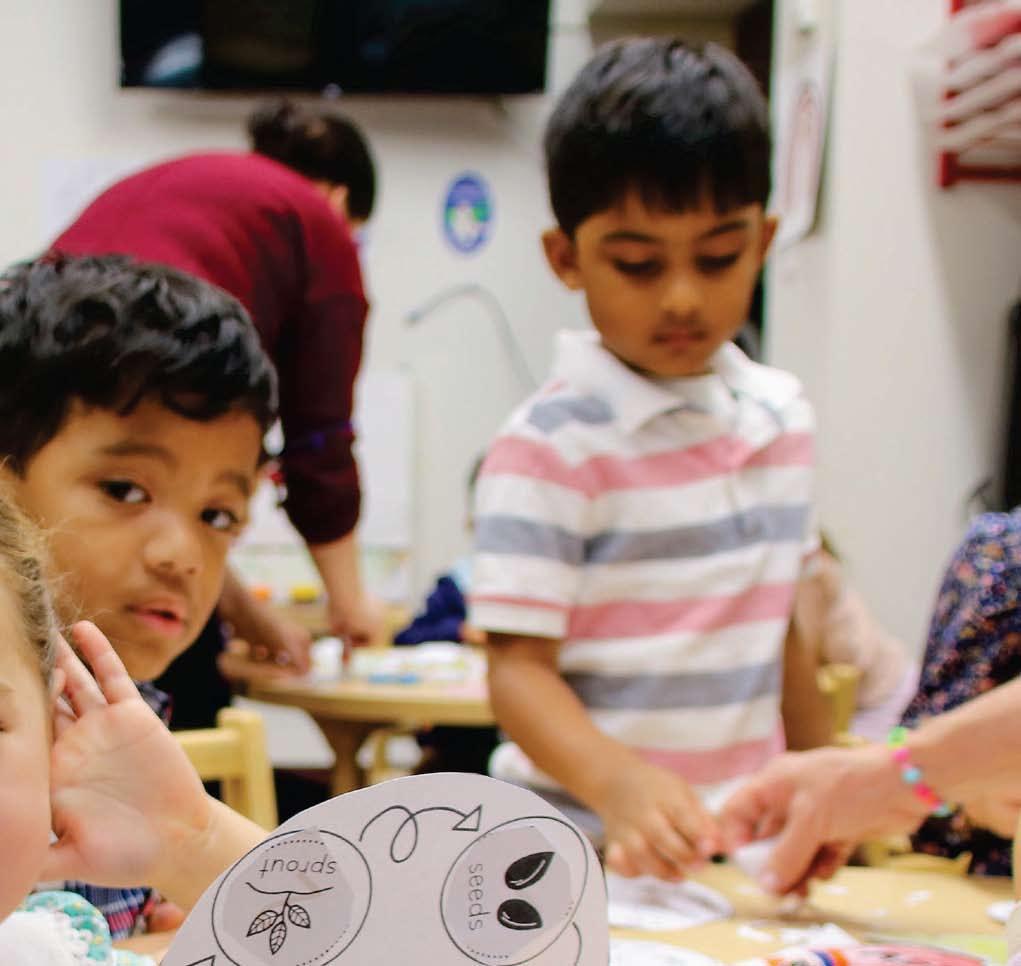

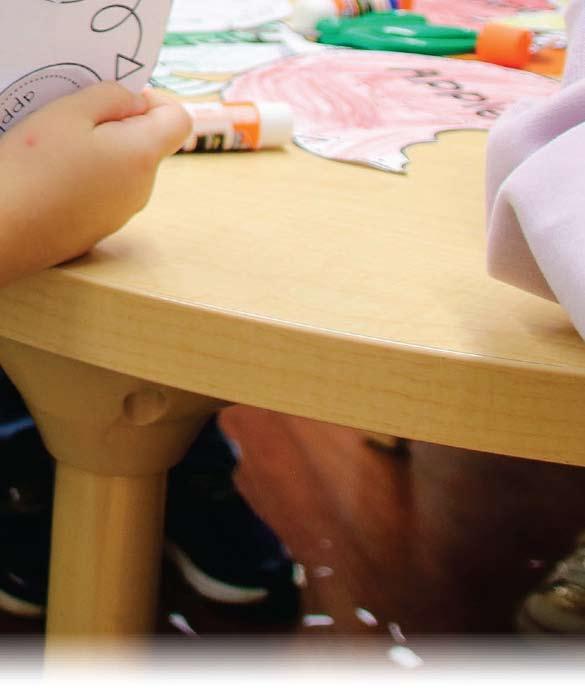









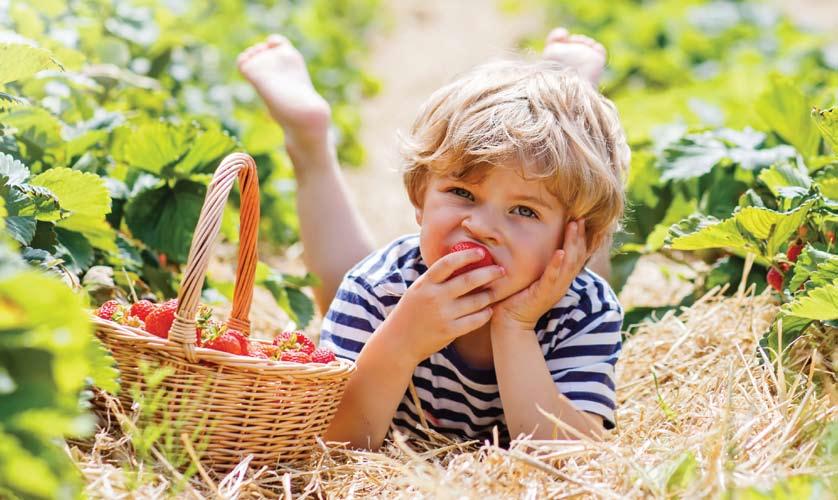
& ColUM ns
8 | Motherhood Milestones
The unrealistic expectations set by your news feed
10 | Maternal ambivalence
Explore the contradictions of motherhood
14 | nyc ’s Postpartum c are crisis
New moms are not receiving the support they need.
16 | Maternal Mental Health
Identify key differences between baby blues and something more serious
6 | editor’s n ote
Happy Mother’s Day!
22 | Parenting Teens
Meaningful ways to connect with your teenager
24 | Preschools & Montessori
Schools in Queens
Our top picks for early education
18 | family Day o ut
Why spending a day at the farm can help bring families closer together
28 | c alendar
The best local family-friendly events this May
on TH e cover

NewYork-Presbyterian is the hospital with unrivaled experience, treating more heart patients than any other top hospital in the nation, and with the only comprehensive cardiac program in Queens.
We deliver the most babies in New York City and Westchester, and have the most pediatric specialists in New York.
With doctors from Weill Cornell Medicine, we cover all your family’s health needs in Queens—bringing world-class care closer to home.
Dear New York Families,
Mother’s Day always sneaks up on me—somewhere between soccer and baseball practice, school projects, and the constant chaos of daily life with two growing boys. To be honest, I’ve never been big on the holiday—I am not usually into others making a fuss or being the center of attention. But each Mother’s Day I’ve spent as a mom, I take a moment to pause and reflect on the joy, deep love, and utter mayhem my kids have brought into my life. I also don’t mind sleeping in, being served coffee (I didn’t brew myself!) in bed, and the extra snuggles with my boys.
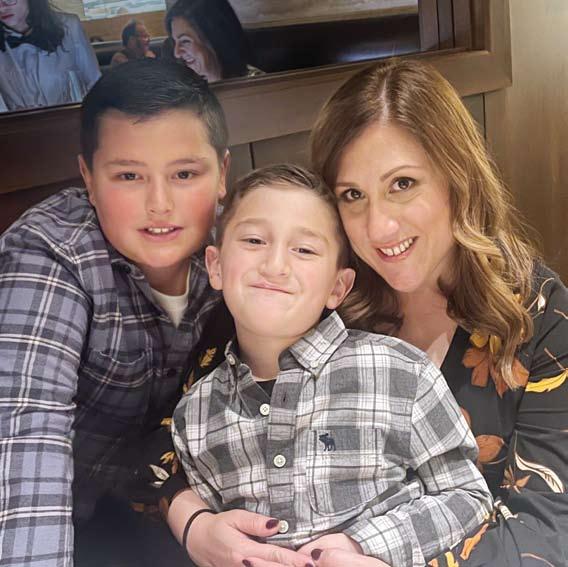
Whether you’re a new mom, a seasoned parent, or a caregiver guiding the next generation, we see you. We know the sacrifices you make and all you do to ensure schedules run smoothly, bellies are full, and kids are cared for. We see the invisible load you carry, and we know it’s not always as easy as some moms may have you believe— curated highlight reels on social media don’t always tell the whole story. If you’ve ever felt like you’re not measuring up, you’re not alone—and you’ll find real insight in our feature on Motherhood Milestone FOMO on page 8.
We continue to explore some of the realities of motherhood, from Maternal
Ambivalence on page 10 to the gaps in postpartum care that many New York moms face in our story on Rising Challenges in Postpartum Care on page 14. We also dive into maternal mental health as we take a closer look at postpartum mood disorders on page 16.
In this issue, you’ll also find ways to celebrate together as a family, from spending a day on the farm picking your own fruit on page 18.
We recognize that Mother’s Day may be difficult for some mothers who may be grieving a loss, doing it all on their own, or who may not feel much like celebrating for another reason. However you choose to celebrate—or not—this Mother’s Day, we hope you feel a sense of connection, discover moments of inspiration, and find a little joy. And maybe you’ll even find a moment to take a well-deserved break.
Warmly, Tara
Share your feedback and ideas about family life in New York!
Email us at editorial@newyorkfamily.com and tag us at #newyorkfamily
Publi SH er: Clifford Luster
eDiTorial DirecTor: Tara Lustberg
aSSociaTe Publi SH er: Erin Brof
aDver Ti S ing Direc Tor: Stacie Goldberg
De P uT y eD iTor: Danielle Ramos
aSSociaTe eDiTor: Náosha Gregg
e venTS Manager: Shara Levine
eD iTorial aSS i STanT: Alexa Lutter
Par Tner SH i P Manager S :
Lauren Alperin, Lauren Anchin, Joan Bergman, Mary Cassidy, Suzanne Cirigliano, Chris Cunnington, Lori Falco, Kent Foglia, Shelli GoldbergPeck, LynnMarie Hanley, Lisa Herlihy, Nicole Miller, Janine Mulé, Nina Spiegelman, Gwen Tomaselli
Marke Ting & S TraTegy Direc Tor: Rosalia Bobé
Marke Ting & evenTS
coor D inaTor : Ashley Rivera
MarkeTing aSSiSTanT: Lorens Morris
Me D ia Sale S aSS i STanT: Ruston Ropac
ar T Direc Tor: Leah Mitch
web Develo P er: Sylvan Migdal
g raPH ic De S igner S :
Arthur Arutyunov, Connie Sulsenti
eD iTorial conTribuTor: Mia Salas
ContaC t inForM ation
aDver Ti S ing : (718) 260-4554
Advertising@NewYorkFamily.com circulaTion: (718) 260-8336
Tina@NewYorkFamily.com
aDD re SS : New York Family Media/Schneps Media 15 MetroTech Center, Seventh Floor Brooklyn, NY 11201
Pre S i D enT: Victoria Schneps-Yunis ceo : Joshua Schneps coo : Clifford Luster

New York Family is the recipient of 12 Parenting Media Awards in 2024, including General Excellence, as well as several Gold Awards in Editorial and Design for our website, e-newsletters and monthly print publication.



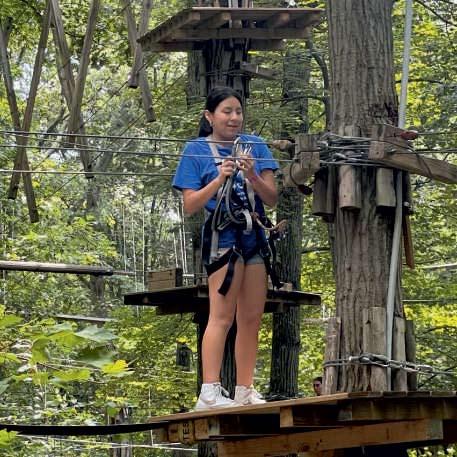





When your own social media doesn’t match your feed, the pressure builds. How to block the noise and protect your mental health
By BarBara russo
Facebook, Instagram, TikTok—social media can be great for anyone seeking advice on a wide range of topics. But sometimes, the constant scrolling can become too much. We know a lot about its influence on kids, but what about the effects of social media on mothers?
It’s not uncommon for mothers to overshare their families’ lives on social media. Whether they’re an “influencer” or not, these highlight reels make it easy for their friends and followers to get caught in a comparison trap. In fact, a recent study even confirmed that moms who spend more time online engage in greater levels of social comparison. This can lead to increased cortisol levels and, in turn, higher stress and negative emotions.
AdditionAl tips
Dr. Patel-Dunn shares some additional tips for building a healthier relationship with social media:
• Be mindful of how you feel before, during and after social media engagement. Get curious about this experience, and ask yourself what boundaries around social media might serve you best.
• Unfollow accounts that lead to increased negative emotions or feelings of comparison.
• If you notice yourself falling into a comparison trap, remind yourself that these glimpses of motherhood do not accurately represent what is going on in a person’s life.
• Focus on social media sites that offer a sense of community rather than comparison.
• Avoid using social media first thing in the morning or right before bed at night. Give yourself breaks to be present throughout the day.

While this occurs most often in first-time moms, parents of multiple kids experience this, too. From their own personal postpartum weight loss journey to their toddlers’ potty training timeline, there’s a ton of pressure to keep up with what seems to feel like a never-ending cycle that continues as children become teenagers, adults and eventually parents themselves. Some therapists call this social media pressure “motherhood milestone FOMO” (fear of missing out).
Anisha Patel-Dunn, D.O., psychiatrist, Chief Medical Officer at LifeStance Health, and mom, is familiar with this topic. She’s been working with patients dealing with this type of pressure. We spoke with Dr. Patel-Dunn, who shared tips for moms on how to cope and have a healthy relationship with social media.
Motherhood is full of milestones, including pregnancy and childbirth, a child’s first steps, first words and more. If your timeline or experience doesn’t match what you see on social media, it’s not uncommon to experience feelings of being left behind or inadequate. Comparison is a common challenge many people face in different aspects of their lives, but for mothers, societal expectations about what makes a “good mother” can make this even more difficult.
Do you find that moms compare themselves to other mothers on social media? If so, is there a lot of pressure for them to keep up
with what their friends, influencers and celebrities are posting and sharing?
There is so much parenting content on social media from celebrities, influencers, friends and loved ones. This content often presents itself as rules or advice for mothers, which can become overwhelming. Another side of this is that many people on social media only show their “best” moments. This is not an accurate representation of their lives. Understandably, moms might fall into a comparison trap, which can contribute to feelings of stress and anxiety.
Can you explain how moms who spend more time on social media experience more stress and negative emotions?
For those experiencing low self-esteem, spending more time on social media and falling into a comparison trap can often exacerbate these feelings. Social media is designed to pull us in and capture our attention, and it can be incredibly challenging to break out of this cycle.
Does social media benefit Mom in any way?
A silver lining of the last few years is that more people have become more candid about their mental health, and this is often seen on social media. It can provide an opportunity to is now part of access a community of likeminded people that you may not be able to access in person depending on your location and personal situation. In that sense, social media can connect moms with peer support regardless of location.



















A therapist’s new book takes a closer look at struggling with mixed feelings about motherhood
BY DANIELLE RAMOS
Motherhood is often romanticized as a journey of pure joy, unconditional love, and endless fulfillment. But for many moms, there’s a hidden side to parenting—the feelings that don’t always match the picture-perfect narrative.
In her upcoming book, Maternal Ambivalence: The Loving Moments & Bitter Truths of Motherhood on sale now, psychotherapist, social worker and mother of three, Margo Lowy, PhD, delves into the often-unspoken, complex emotions that accompany the experience of mothering.
Lowy explores what it means to embrace the full spectrum of feelings that come with raising children—from the deep love and pride to the exhaustion, frustration, and moments of doubt. Through her own personal journey and extensive research, she challenges the societal pressures that demand mothers to be selfless, constantly joyful, and always in control.
In this excerpt, Lowy invites us to confront maternal ambivalence and redefine what it means to be a mother in all its beautiful, messy contradictions.
Being a mom is so difficult some days. We are pulled in so many different directions by our children, and we are supposed to be caring, selfless, and remain an adult all the time, even when it becomes too much. How do we make room to acknowledge and talk about maternal ambivalence, a forbidden and silenced but daily part of our mothering?
Making sense of these contradictions in order to live with them in a peaceful and productive way may be the greatest challenge of all. As a mother of three, I’ve struggled— and still do—with my mothering. While my children are all things to me—the wonder, love, and accomplishment of my life—they also test me continually as I tread the awe, joy, and heartbreak of being a mother and its continual twists and turns. On that score, I’m not so different from any other mother.
I suppose my difference creeps in in the way that I have dealt with my experience of mothering and its combination of awe, joy, and heartbreak. It hasn’t been easy, and why would it be? I have been driven to spend years of my life trying to find ways to make sense of mothering and the mother’s feelings of ambivalence.
I have pondered its contradictions and mystery while questioning the status quo and the wider social commentary.
It seems to me that most people feel entitled to freely comment on the sacred feelings that a woman experiences as a mother, often leaving her with deep, unsettling feelings that may be hidden in the shadows or feel shameful.
Ironically, this research and work on mothering began with a foray into infertility and the heartache that a woman usually feels when she is unable to conceive. My belief that these feelings are too important to ignore, too fragile to be denied, also segued into a desire to shine a light on the desperation that many mothers feel.
Both infertility and mothering, in their own way, provoke a sense of failure or lacking, a yearning, and many negative feelings that go unspoken. Both hold an element of taboo. That’s the fascination for me: the jumbling, contradictory flow of life.
This raises another matter, which is that this is not a book about whether or not to have children, despite the fact that maternal ambiva-



lence is sometimes understood in these terms.
To this point, I strongly believe that most women who decide not to have a child do not come to their decision lightly; more often than not, it arrives after a great deal of soul-searching. These women merit exactly the same respect as those who decide that they wish to rear a child; they don’t justify derision or voicelessness.
Across all cultures in this world, there is a universal truth, which is that motherhood defines womanhood in some way, whether we have children or not. We are judged for the ways in which we raise our children and judged when we choose not to raise them.
Men and fathers, too, experience the conflict of parenthood and that dialogue, and while much different than it was even a halfcentury ago, it still has much progress to make. My focus in this book, however, is the intersection of womanhood and motherhood—the relationship that springs into being after birth and exists long after a child has left the nest.
Every mother has her moments when troubling feelings, including those of desperation, anger, loneliness, exhaustion, and



despair, surface despite attempts to keep them down where she thinks that they belong. I think these moments have been disregarded or cloaked in denial.
It’s time to air and name them, and in doing so, redefine the image of a mother as either a demon or an angel into one where she is an ordinary human being—one who, despite



having these feelings, does still love her child deeply and, in fact, within these troubling feelings, discovers that her love is strengthened and fueled in the soundest way possible because these feelings are genuine and real.
Ambivalence is the human capacity to acknowledge, own, and engage with many contradictory feelings, without dismissing the difficult ones. An indication of a healthy mindset is an acceptance that this dynamic is part of life, that challenges will crop up from time to time, and that the individual is prepared to work with them and not to dismiss or repress any of them. While the idea of ambivalence certainly throws many curveballs, let’s welcome it: it’s the unsung hero(ine) of mothering.
Margo Lowy, PhD, is a psychotherapist specializing in mothering. She is the author of MATERNAL AMBIVALENCE: The Loving Moments & Bitter Truths of Motherhood (Post Hill Press) and holds a doctorate from the University of New South Wales in Sydney, Australia, where she researched maternal ambivalence. She is the mother of three children and lives with her husband in New York City.

















By Náosha GreGG
For many, motherhood starts a new chapter of life. New mothers experience a whirlwind of emotions – happiness, joy, fear, and nervousness – as they prepare to begin their new life journey with their bundle of joy. While many show the highlights of life post-birth (we’re looking at you, Instagram highlights!), proper postpartum care is a considerable part of the behind-the-scenes.
Maternal health has always been an issue across the five boroughs. According to the New York State of Health, between 2018 and 2020, there were 121 pregnancy-related deaths in New York State, averaging approximately 40 deaths per year. However, while many mothers have reported not receiving adequate care before and after birth, the focus on postpartum health has not had as much advocacy. A report from March of Dimes found that approximately 12.5% of birthing individuals in New York receive inadequate prenatal care, which is below the national rate of 14.8%.
32% of mothers in this stage across the city report high levels of medical mistrust, and one in five new and expecting mothers in New York City experience perinatal mood and anxiety disorders (PMAD), including depression, anxiety, and postpartum psychosis. Postpartum depression (PPD) is one of the leading causes of suicide, accounting for 20% of postpartum deaths. It is also during this time that individuals are most at risk for perinatal suicide, as many occur between nine to 12 months postpartum.
Many mothers struggle with postpartum care as economic and financial circumstances come into play. On average, it would cost a new mother $40 to $70 per hour for doula support.
“Postpartum is often seen as an afterthought – often just making sure the baby is happy and healthy, without considering the mother’s well-being, too. Physical recovery, mental health,

breastfeeding, lack of sleep, and everything in between can make this period extremely difficult,” says Joy Windley, Postpartum Doula, CLC, and assistant manager at Boram Care, a postnatal retreat for mothers and newborn babies in New York City.
“There are a lot of barriers to adequate care, whether that’s lack of paid family leave, rising medical costs, and general pressure put on moms to just “deal with it” after they give birth. Postpartum care is often seen as a luxury when it should be essential for every mom. This isn’t just something we see in New York City — it’s a societal shift we need across the country.”
The 5-5-5 postpartum rule recommends that new mothers take 15 days of rest after giving birth: Five days in bed, five days on the bed, and five days around the
bed. This encourages new moms to spend time bonding with baby instead of doing housework, caring for older children, or returning to work. However, the high cost of living in New York City, which is 77% higher than the national average, makes it difficult for many parents to take this much-needed time away.
How We Can Heal
New York State has made some progress in supporting new mothers by requiring health care providers to screen for PPD and other postpartum mood disorders during postpartum follow-up appointments and baby’s pediatric well-visits.
The city has also launched initiatives such as allowing emotional support dogs during and after birth and providing newborn
supply kits to new parents. However, some mothers still hesitate to ask for help.
“The first step is talking about it with friends, family, and healthcare providers. There’s such a stigma around postpartum wellness and knowing that if you’re struggling with breastfeeding, mental health, identity shifts, and the overwhelming emotions that come with new motherhood,” says Windley. “I also encourage new mothers to give themselves permission to ask for help, whether it’s from a partner, a doula, a lactation consultant, or a mental health professional. Recovery isn’t linear, and there’s no one-size-fits-all path. Building a support system, staying connected to your body, and being gentle with yourself can make a real difference.”
Postpartum mothers are not alone; they are encouraged to reach out for help if they may be experiencing PPD or other psychological symptoms. To learn more, read our story — “Postpartum Depression or Just the Baby Blues?” — in this issue. For resources and information, visit the following support groups across the city:
“There are a lot of barriers to adequate care, whether that’s lack of paid family leave, rising medical costs, and general pressure put on moms to just ‘deal with it’ after they give birth. Postpartum care is often seen as a luxury when it should be essential for every mom.”
The Motherhood Center of New York
Located in Manhattan, this center offers comprehensive services for individuals experiencing PPD and other perinatal mood and anxiety disorders (PMADs). Their programs include a specialized Day Program for moderate to severe cases, outpatient therapy, medication management, and virtual support groups. themotherhoodcenter.com
Postpartum Resource Center of New York (PRCNY)
PRCNY provides free support and resources for new parents across the state. They offer weekly virtual support groups, individual peer coaching, and a toll-free helpline at 1-855-631-0001, available daily
from 9 am to 5 pm. postpartumny.org
Postpartum Support International –New York Chapter
This organization connects individuals with local support groups, therapists, and educational resources throughout New York. psichapters.com
Seleni Institute
Based in Manhattan, the Seleni Institute offers mental health care, counseling, support groups, and maternal and reproductive mental health workshops. It also trains mental health professionals in perinatal mood and anxiety disorders. seleni.org

How to determine the difference between hormones and something more serious — and when to ask for help
By Ashley Ziegler
Welcoming a new baby into your life comes with expected emotional ups and downs. Suddenly, you’re responsible for a tiny human who can’t even hold its head up yet – this kind of responsibility is overwhelming, to say the least. Toss in the dramatic hormone fluctuations that come naturally after giving birth, plus the physical toll of recovery, and it’s a wonder how a new parent wouldn’t feel a little out of control.
Still, as normal as it is to feel a mix of highs and lows in the first few weeks after having a baby, often known as the “baby blues,” it’s essential to stay alert and monitor what you’re feeling, as you may be experiencing postpartum depression (PPD).
To help make the distinction between the baby blues and PPD, we spoke with Janel Coleman, LMSW, a doula and licensed psychotherapist at Madison Square Psychotherapy in Manhattan, and Jessica Vernon, MD, FACOG, PMH-C, an OBGYN, author, and clinical director at Oula in Manhattan. Here’s what they had to say.
What’s the Difference Between Baby Blues and Postpartum Depression?
Around 85% of birthing parents experience symptoms of baby blues, while around 12.5% are diagnosed with PPD. Given how common the baby blues are, it’s no wonder why signs of depression are so easily overlooked. In fact, the symptoms of each are incredibly similar.
According to Coleman, symptoms of baby blues can include feelings of anxiety, sadness, tearfulness, difficulty concentrating, irritability, and difficulty sleeping (even when baby is sleeping). These are all also signs of PPD, but according to Dr. Vernon, the difference is in the onset, duration, and severity of these symptoms.
Baby blues
“Baby blues are a common and temporary emotional experience during the postpartum
period … they typically occur within the first two weeks after the baby is born,” explains Coleman. Dr. Vernon describes the symptoms more as mood swings. “You may be laughing one minute and crying the next, often not even knowing why you are crying, then just as quickly changing again to a happier state,” she says. Dr. Vernon explains that these dramatic mood changes can be attributed to “rapid hormonal shifts that occur after the baby is born” and typically level out within the first two weeks after delivery.
In addition to being short-lived, baby blue symptoms are less intense than PPD symptoms. Dr. Vernon says, “The lows are not severe or persistent – you can easily ‘snap out of it.’” Also, while they can certainly feel overwhelming in the moment, Coleman notes that baby blues symptoms typically aren’t severe enough to interfere with a new parent’s ability to care for their baby or themselves.
Postpartum depression
Just like the baby blues, symptoms of PPD can show up within the first two weeks of the postpartum period, but they won’t fizzle out. Both Dr. Vernon and Coleman stress that symptoms lasting longer than those first two weeks after baby arrives indicate it’s more than baby blues.
Not only do the symptoms last longer, but they’re also more intense with PPD. Coleman explains that these symptoms can become so severe that they can interfere with a parent’s ability to meet the needs of their baby. In some cases, the parent is able to care for the baby, but they stop taking care of themselves — they may stop eating or drinking, skip basic hygiene tasks for days on end, withdraw from family and friends, or not get enough sleep (beyond the typical parents-of-newborn sleep deprivation).
Symptoms that PPD shares with the baby blues but will be more severe include:
• Anxiety
• Irritability
• Feelings of sadness
• Difficulty concentrating
• Tearfulness
• Difficulty sleeping
Additional symptoms Coleman says to look for include:
• Feelings of hopelessness
• Difficulty bonding with baby
• Lack of interest in pleasurable activities
• Withdrawing from family and friends
• Doubts or fears about their ability to be a good parent
• Thoughts of harming themselves or baby
Postpartum Depression Treatment Options
In New York, the birthing parent’s health care provider screens them for postpartum depression (or postpartum mood disorders,
in general) during follow-up visits. However, these visits are usually not scheduled until several weeks after delivery. In 2023, the state passed legislation requiring pediatricians to perform maternal mental health screenings during baby well-visits, which occur within days of being released from the hospital.
Early identification, diagnosis, and treatment of PPD are essential for effective maternal mental health care. As part of the state’s effort to prioritize this, the Department of Health and the Office of Mental Health developed official guidance and standards for maternal depression screening and referrals, and insurers are required to cover screenings and treatment without prior authorization.
Once someone has been diagnosed with PPD, Dr. Vernon says their treatment plan will depend on how severe their symptoms
are and what the patient wants. “[Treatment] is often a personal decision made with your care team,” she notes.
When a patient comes to her with PPD, Dr. Vernon says she checks to ensure they are not anemic, that their thyroid functions are normal, and that their vitamin D levels are optimized. “All of these things can contribute to symptoms of PPD,” she explains, and she will ensure the patient’s treatment plan also addresses these factors when appropriate.
Beyond these tests, Dr. Vernon says PPD treatment options can include a combination of psychotherapy, psychopharmacology (medication), peer support groups, and well-being practices (meditation, exercise, acupuncture, outdoor time, etc.).
Dr. Vernon also highlights the importance of sleep for those who are experiencing
postpartum depression. “One of the first recommendations mental health providers always give is to utilize your support system or bring in extra support so that you can get more sleep.” In cases where PPD interferes with the ability to sleep, a breastfeeding-safe sleep aid may be recommended.
Postpartum depression is one of the more well-known postpartum mood disorders, but there are several others a new parent may also experience. Possible diagnoses include:
• Postpartum Anxiety
• Postpartum OCD
• Postpartum Panic Disorder
• Postpartum Bipolar Disorder
• Postpartum Post Traumatic Stress Disorder
• Postpartum Psychosis
Coleman emphasizes that those who were diagnosed with mental health disorders prior to pregnancy or during pregnancy are 30% more likely to experience a postpartum mental health disorder.
It’s also worth noting that new parents can be diagnosed with more than one postpartum mood disorder at once. “You may experience one or many of these [mental health disorders], and seeing a provider trained in diagnosing them can be critical in understanding exactly what you are experiencing and what may best help you feel better,” says Dr. Vernon.
If you suspect you’re experiencing symptoms of postpartum depression or any other postpartum mood disorder, it’s essential to reach out to your provider for help. Your feelings are valid and shouldn’t be dismissed as “just hormones.” With the right treatment and care team, you can (and will) start feeling better.
Experts:
Janel Coleman, LMSW, is a trained fullspectrum doula and a licensed psychotherapist at Madison Square Psychotherapy in New York City. Her focus areas include providing support during the trying-to-conceive, prenatal, and postpartum periods.
Jessica Vernon, MD, FACOG, PMH-C , is an OB-GYN and clinical director at Oula. She’s also an advocate for perinatal mental health, as well as author of the book Then Comes Baby: An Honest Conversation About Birth, Postpartum, and the Complex Transition to Parenthood.



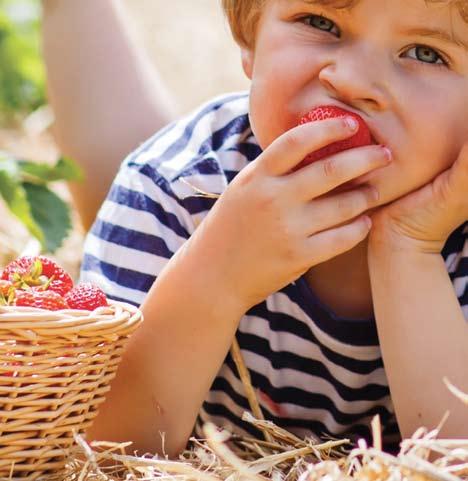

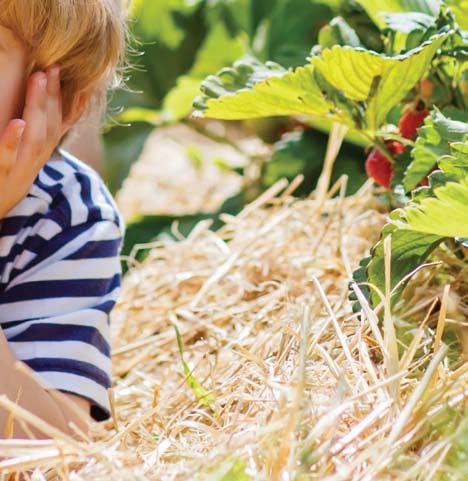
BY ALEXA LUTTER
Nowadays, farms are so much more than red barns, milking cows, fresh eggs, and Old McDonald’s. Farm visits have become a popular outdoor family excursion. Not only do farm trips teach us about agriculture and where our food comes from, but they also get our families off their devices and out of the house and take us to a different scenery. Farms also allow fun and interactive experiences, like picking your produce. As an added bonus, they provide the perfect backdrop for a family photoshoot.
We are sharing tips and helpful information you will need to prepare for your next trip to the farm!
Why Pick Your Own?
Sensational Scenery
The scenery at these farms and fields can be
breathtaking. They serve as fantastic photo ops for the whole family and are Instagramand holiday-card-worthy all year round. So make sure your phone is fully charged and set in the right mode for all the beautiful photos you are going to take.
Health Benefits
There is nothing like smelling fresh lavender, biting into a crisp strawberry, or plucking the perfect apple off a tree. Picking your own produce has both mental and physical health benefits. Getting outdoors has been proven to boost your vitamin D levels and reduce feelings of stress. Visiting farms allows you and your family to stimulate all five senses. It could make even your picky eater try something new! Having fresh produce at home promotes healthy eating and may even entice your picky eater to try something new. Whether you are buying produce or not,
the environment lends itself to a new kind of outdoor experience, so breathe in the fresh air and enjoy your surroundings! Most farms provide rich knowledge about agriculture, as it is both interesting and beneficial to know where your food is coming from.
Environmental Benefits
Visiting a farm is a great way to support small businesses and local farmers, which in turn helps stimulate the local economy. This support promotes sustainability and ecological preservation. You can further support the environment by carpooling to farms with friends to reduce fossil fuels!
Taste the Difference
One of the best benefits of picking your own produce is stocking your fridge and pantry with all the yummy fresh fruits and veggies! Once you bring all the produce home, the possibilities are endless. You can create your own jams, jellies, pies, and more. Check out recipes to make after pumpkin picking and apple picking.
If you’re not the recipe-following type, no worries! Most of these farms feature a market where you can purchase seasonal farm fresh fruits and vegetables grown onsite. They carry high-quality homemade ciders, coffees, teas, maple syrups, honey, jams, yogurts,


Students ages 10 and older must have previous ballet training. Advanced registration required.
Pre-Professional Program (ages 7–17)
June 10, 11, and 12
Audition registration opens May 20
For more details: Ailey.org/Auditions Email: juniordivision@alvinailey.org



















































Spec La Diff Thru













Most major health insurances accepted Evening and weekend hours available! Most health insurances and weekend hours available!


















Specializing in the Treatment and Correction of: Language Disorders, Memory & Auditory Processing Difficulties, Voice & Motor Planning Disorders, Tongue Thrust, Thumb Sucking, Feeding & Swallowing Aversions, Articulation Disorders and MORE!









East Yaphank • Farmingville • Stony Brook • Commack Islip Terrace • Westhampton • Jericho • Wantagh • New Hyde Park
Jericho




Brook • Commack Terrace
New Hyd
LISPEECH COM 844-5-SPEECH LISPEECH.COM
Home of the
Park e Tong









SPOT PAL CAN HELP! Try the world’s first tongue training appliance today! SPOTPAL.COM | (631) 675-1254






Tongue Thruster? Nail Biter? Mouth Breather? TMJ? Lisp? Snorer? Thumb Sucker?






675 1254
























cheeses, and more. The options are endless! Find a farm with a bakery, and you hit the jackpot! If you have never had a hot, fresh apple cider donut, you have no idea what you are missing! Stock up on your favorite pies to share with your families, a popular holiday option.
There is nothing like a fresh, sweet, and slightly tangy strawberry. They’re popular with kids in their natural form, but the possibilities for family-friendly recipes are endless. Some favorites include strawberry jams, yogurt, and pancakes.
Parents, are you looking for a real treat? Homemade strawberry daiquiris make the perfect summer cocktail. Cheers!
When to go? May and early June
How much? $5.50 to $8.00 per pound
Picking tips : When picking the perfect strawberries, look for vibrant red and fully shaped strawberries. Strawberries do not ripen after being picked, so you want to grab the ripest ones immediately. When picking your strawberries, grip the stem above the strawberry, twist, and pull. Be careful when storing strawberries in containers so as not to overcrowd the container, which may cause strawberries to bruise or become mushy. When you go home, refrain from washing the strawberries until ready to use them; washing immediately increases the chances of spoiling faster.
Peaches have a bright and sweet flavor with notes of tartness. They have been called a superfood and contain excellent sources of vitamins A and C. They are versatile; keep it simple with sliced peaches and cream, or whip up a decadent peach cobbler.
When to go? Late July through September.
How much? Approximately $3.00 per pound
Picking tips: When picking the perfect peach, there are many things to keep an eye out for. First, you want to examine the peaches’ skin to see if there is any green on it. If there is, the peach is not ready to be picked. Additionally, use your sense of smell! Ripe and ready peaches will give off a sweet aroma; when there is no aroma, the peach needs more time to ripen. Finally, make sure the fruit is not too firm and easy to retrieve from the tree. When bringing peaches home, store them in the refrigerator to slow down the process of ripening. For long-term
storage, you can freeze them in an airtight plastic bag.
Sunflowers are commonly associated with summer. They add a pop of color to any space, whether it is your backyard, kitchen, or living room. Sunflowers can be displayed and used for crafts, composting, and more. Sunflower fields open the door for Instagram-worthy pictures. There are usually many fun activities for families, such as mazes and bouquet-making.
When to go? M id-summer
How much? Approximately $2.00 a flower
Picking Tips: Some sunflower farms or fields let you pick your own sunflowers, while others sell them. You are usually allowed to enter the fields for photos either way, but check the farm’s policy first.
Nothing says fall like a nice crisp apple plucked straight from a tree. Apples are one of the most diverse fruits and are used in many different delicious ways. Cider, pie, tarts, juice, and more are all delicious options – not to mention biting into one the old-fashioned way. There are many apple varieties, so choose a farm growing your favorite kind. Or try them all!
When to go? Late August until mid-tolate October.
How much? Apple prices vary by variety and are typically sold by the pound.
Picking tips: There are many things to look out for when choosing apples. You want to ensure the apples you pick are free from any blemishes or bruises. Apples should be firm to the touch and not mushy. Another helpful tip is to look for apples with stems intact, as the stem keeps the apple good for longer. Be mindful when you pick the apple to keep the stem intact.
Pumpkin picking is a fall staple and perhaps the most popular fall outdoor activity for families. After everone chooses their favorite pumpkin, many families follow the treasured tradition of carving them. Kids love the joy of picking their own pumpkin to turn into a unique Jack-o’-lantern and displaying it proudly outside during Halloween. Grab a few extra pumpkins to create delicious recipes such as pumpkin pie, bread, muffins and more. Pumpkins are a healthy food that provides calcium, potassium, and magnesium. Don’t forget to roast the seeds!
When to go? September through late October.
How much? Prices vary greatly depending on size, but they average around $5.50 each.
Picking tips: Color is everything when it comes to the perfect pumpkin. You want to pick a deep orange pumpkin with no blemishes or bruising. If you are looking for a pumpkin to carve, look for one that will have enough room for your design and a smooth outer shell. When bringing home your pumpkin, you definitely want to clean it. Pumpkins can be prone to bacteria, which could result in decay.
Christmas tree farms allow you to observe these gorgeous trees in their natural habitat and take them to your home to decorate. Picking your own tree creates a special memory within the family for the holidays. Not to mention, having a real Christmas tree will hit you with joy the second you open your front door, thanks to its unmistakable aroma. Most Christmas tree farms also sell wreaths, garlands, and more. As an added treat for the kids, many tree farms offer a visit and photo opportunity with Santa! When to go? Late November through December
How much? Though they vary, on average, trees cost about $85.
Picking tips: Bundle up! It will most likely be very chilly, and you want your family to be as comfy as possible. Always feel free to ask farm workers questions to find your perfect tree. Your tree should be a healthy green color and the size of your liking. Christmas trees can be large, so measure ahead and ensure you have space in your vehicle to transport them home.
Additionally, look for branches with space to hold all your decorations and ornaments; flimsy branches will result in falling “needles.” When you get home, you will need fresh water to keep your tree well-hydrated. The amount of water you need depends on your tree and trunk size.
Visiting pick-your-own farms offers a delightful way for families to connect with nature while enjoying fresh produce together. These experiences not only enrich our understanding of where our food comes from but also provide lasting memories amidst stunning landscapes. So, gather your loved ones, plan your next farm adventure, and savor the joys of picking your own fruits and vegetables this season!

embark on a whole new adventure of discovery & learning





DANCE & PARKOUR SPECIALTY CAMP FOR 5 - 8 YEARS
All new week-long specialty camps are designed to inspire campers ages 5-8 to discover a new passion this summer! Explorers Camps tap into each child’s natural abilities, while diving deeper into dance or parkour. Offered at select NY Kids Club locations throughout NYC.
FIND YOUR LOCATION enroll now for early bird savings!
SUMMER CAMP FOR 2.5 - 5 YEARS
Discover a whole new summer adventure this year at Camp Kids Club, where campers immerse in nature-based thematic learning, with enhanced outdoor time, age-appropriate exploration, and indoor activities that bring elements of the natural world into the classroom.










By Serena norr
One thing they never warn you about before having a baby is that eventually, babies grow up into teenagers. Much like parenting a baby, parenting teens can be equally challenging and amazing. As your kids are growing up, they are navigating a new terrain with extended responsibilities, questions about life, and simply finding their way. In some instances, teens might rebel, act out, or shut down. Others might be dealing with mental health issues, or simply feel overwhelmed by the many things they have on their plates. As parents, it’s important to be there for them and allow them to explore and find themselves. So, we are sharing some tips on how to navigate the teen years.
Keep the communication open and be a good listener
Teens, in general, are sometimes known to shut down. This can include closing you off from the conversations and/or giving you limitedto-no responses. Try not to take this personally as teens are also figuring out who they are as well as what they believe in. Establish an open dialogue with them so they know that they can go to you. It’s important not to stress out or force conversations, but rather be open to their journey and listen. Teens need parents to listen as a way to feel understood, which can help to forge a closer connection. Sometimes this might even involve walking away from a conversation or revisiting it if anger comes into play.
Let them explore and encourage them
Teens, unlike younger kids, are figuring out their interests and/or what they enjoy doing. Give them the space to figure out their interests/passions as well as support their journey, even if you might noy completely understand it. It is important for them to feel your support and know you are there for them.
Provide guidance and give clear guidelines
You want your teen to know what is accept-

able about where they are going and/or who they are hanging out with. This is a good time to discuss values,making good choices, and any challenges that might arise. Make sure they understand the consequences of not following the guidelines, which could be anything from breaking curfew to drinking to being grounded.
Respect their values
Your teen might not have the same values and views as you. Show them that you respect what is important to them and ask them to explain why it is important to them if you are conflicted. Showing that you care about them and respect them will go a long way as you address your concerns while still supporting them.
time together
Despite what they might think, your teen is still a child who needs you differently now. Show them that you care and you’re interested in them by doing things together. This could be you enjoying something that they love or involving them in one of your favorite activities. Be consistent and make it a point to show up for them, focusing on activities without the clutch of devices or technology. Try yoga, hiking, or even simply enjoying a meal together.
Share your experiences
Even though they might not say it, they look up to you. Share your lived experiences, including some hard life lessons you had to learn at their age. They will appreciate – and
maybe even be shocked – by how human you are.
Be a role model
Your teens are watching. Model traits that you would want them to embody such as kindness, thoughtfulness, curiosity, confidence, patience, and more. It is also important for them to see you being passionate about what you do. This can also include your volunteer work and how you show up in the family. Even if they might not be expressing these traits now, they are absorbing everything.
Make sure teens get enough sleep
Teens may think they can operate on little sleep, but as we know sleep is vital for everyone to function and be in a better mood. Set realistic goals around bedtime, including an electronic curfew or no screens after a certain amount of time. Also, make sure they get up at a decent time on the weekend.
Reach out for support
While you can do all of the “right” things, there’s still a level of complexity when it comes to parenting teens. Know that this is all part of their journey and will take time for them to find their way. Find local parenting support groups – with a focus on teen parenting as well as teen specific issues to communicate your struggles with others in a similar situation.
In NYC, check out Parenting Teens in NYC, NYC Parents with Disabilities, and Raising Teenage Girls Is HARD! Parenting Teens Support Group by Teen Thrive on Facebook.
Check in your teens mental health
We are in a mental health epidemic. According to the Center for Disease Control, “more than 4 in 10 (42%) students felt persistently sad or hopeless and nearly one-third (29%) experienced poor mental health.” This problem is continuing to heighten with common pressures, social media, and issues at home and school.
Check in with your teen to see how they are doing. Some ways to monitor this might be assessing their energy levels, digestion issues, headaches, increased anxiety, anger, eating issues, memory problems, and more. If you are concerned, contact your local doctor or find a support group or therapist, and be present for them.











































































As we anticipate the arrival of summer, now is the perfect time to consider your child’s early educational journey. Whether you’re a first-time parent or you’re exploring new options, finding the right preschool can feel overwhelming. Identifying programs prioritizing creativity, social interaction, and foundational learning is essential. But is a traditional preschool or a Montessori school—which offers a unique approach that encourages child-led exploration and independence—right for your little one? We’ve explored some local preschools and Montessori schools to give you a head start to securing a spot that aligns with your values and nurtures your child’s interests.


b uckley country Day School
2 I. U. Willets Road, Roslyn 516-627-1910, cfortuna@buckleycountryday.com buckleycountryday.com
Buckley Country Day School is an inclusive community that nurtures the whole child, preparing students for success in high school, college, and beyond. The school’s mission, Opening The Eyes And Awakening The Mind, is at the heart of its curriculum, where Buckley’s youngest learners embark on a lifetime of discovery in a caring, positive environment. The school’s Early Childhood program supports children’s physical, cognitive, social, and emotional development through play-based learning, laying a strong foundation for entry into Lower School. Buckley welcomes students as young as age 2 in Pre-Nursery and admits students on a rolling basis through grade seven.
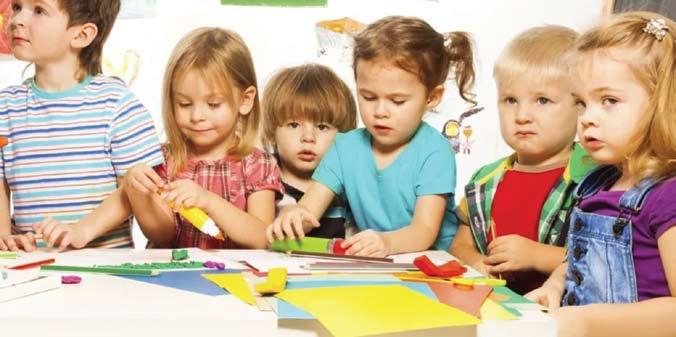
countryside Montessori School
354 Lakeville Road, lower level, Great Neck 516-466-8422, info@cmsgn.com www.cmsgn.com
Countryside Montessori School believes in creating a peaceful atmosphere where respect toward each other, community and the environment are an everyday occurrence. The school offers children ages 18 months to 6 years a well-balanced and enriched curriculum, which includes traditional subjects, art, and music. They are in an estate-like setting with an outdoor playground and nature walks. Classrooms are fully equipped and spacious. The school has two toddler classrooms and two primary classrooms. The toddler class is for 18 months to 3 years old. The primary class is for 3 to 6-year-olds and includes nursery, pre-K, and kindergarten. The primary class curriculum contemplates a three-year cycle. There are after-school programs offered throughout the school year. Proudly serving Great Neck, Manhasset, NY, and the surrounding community.

kon g en i nternational Preschool 196-25 42nd Avenue Flushing 718-281-2338, kongenbaysidfe@gmail.com kongeninternationalpreschool.com
Founded in 2014, Kon Gen International Preschool is a child-focused and family-friendly preschool in Queens, serving children ages 2-5. The 20,000+ square-foot facility includes an outdoor playground, indoor playground, and a dance studio. To support working families the school is opened Monday-Friday from 8 a.m. to 6 p.m. As a NYC Department of Education 3K and Pre-k for All provider, the school offers free 3K and Pre-k classes. In addition, the school also has a part-time and full-time toddler program for 2-year-olds. The school strongly believes children learn best through play and exploration, integrating reading/writing, math, science, art, dramatic play, and social studies into their daily activities.
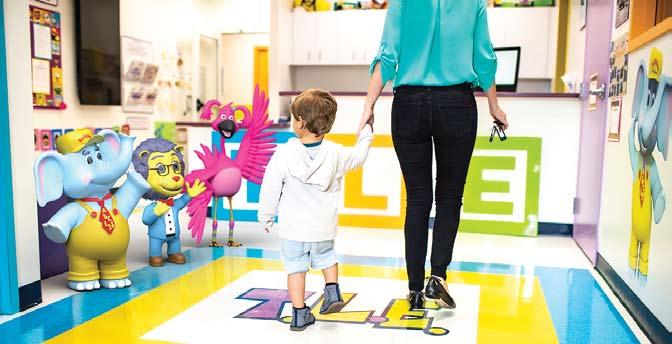
The learning e xperience (b ayside) 215-15 Northern Blvd., Bayside 718-224-1760, bayside@tlechildcare.com thelearningexperience.com/centers.bayside
The first day at The Learning Experience is their initial introduction to infant daycare, early childhood education, and structured learning for many children. The goal is to ensure each child feels inspired and at home from the very beginning, which is why The Learning Experience centers are thoughtfully designed to be vibrant and joyful environments. Recognizing that children have dramatically different needs at various stages of development, each Learning Experience center features age-appropriate classrooms and playgrounds. Each center includes two separate playgrounds – one for toddlers and another for preschoolers – where educational toys and equipment are hand-selected by a team of early education experts, and every detail is carefully considered to ensure children are safe, secure, and supported throughout their day.


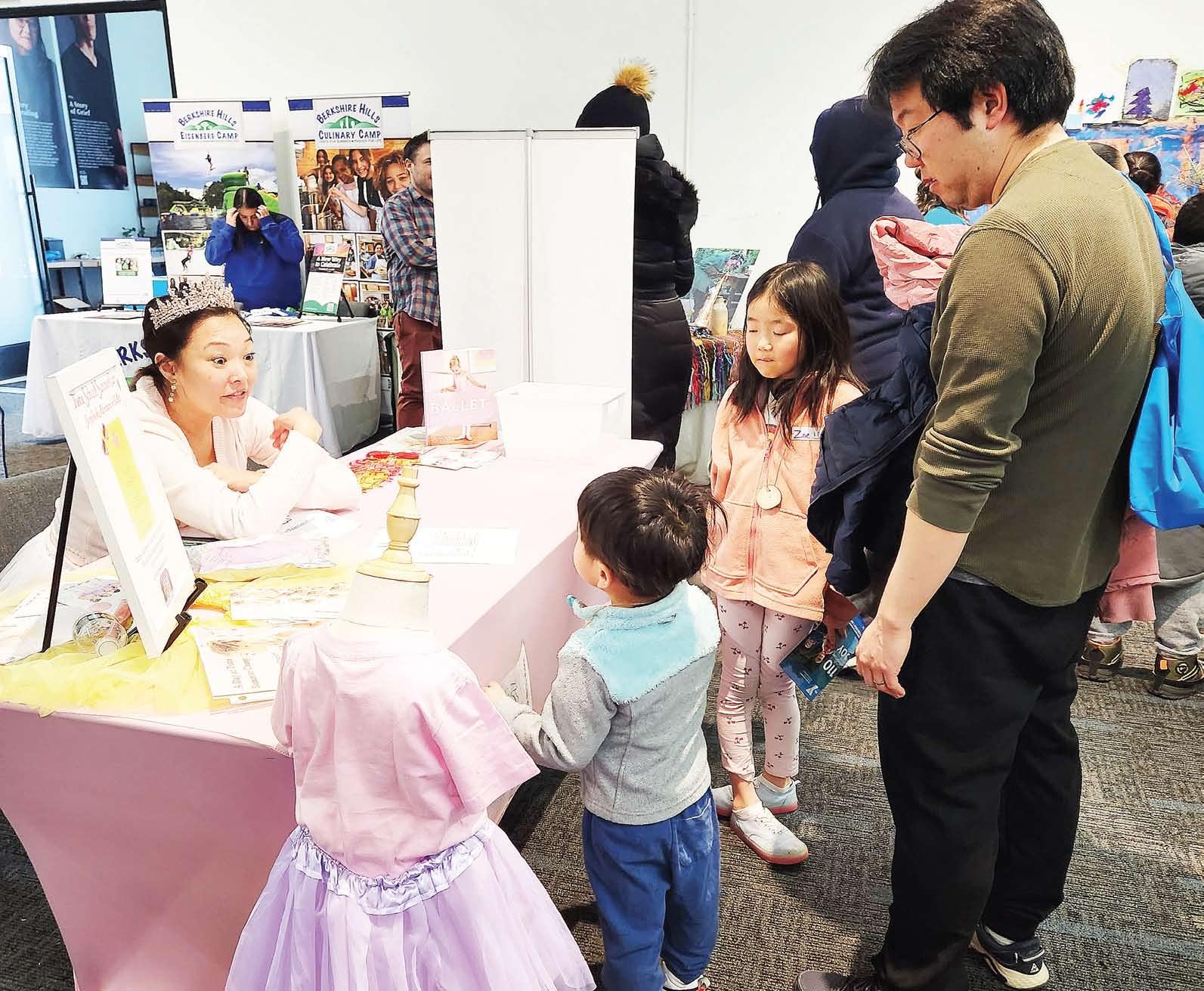

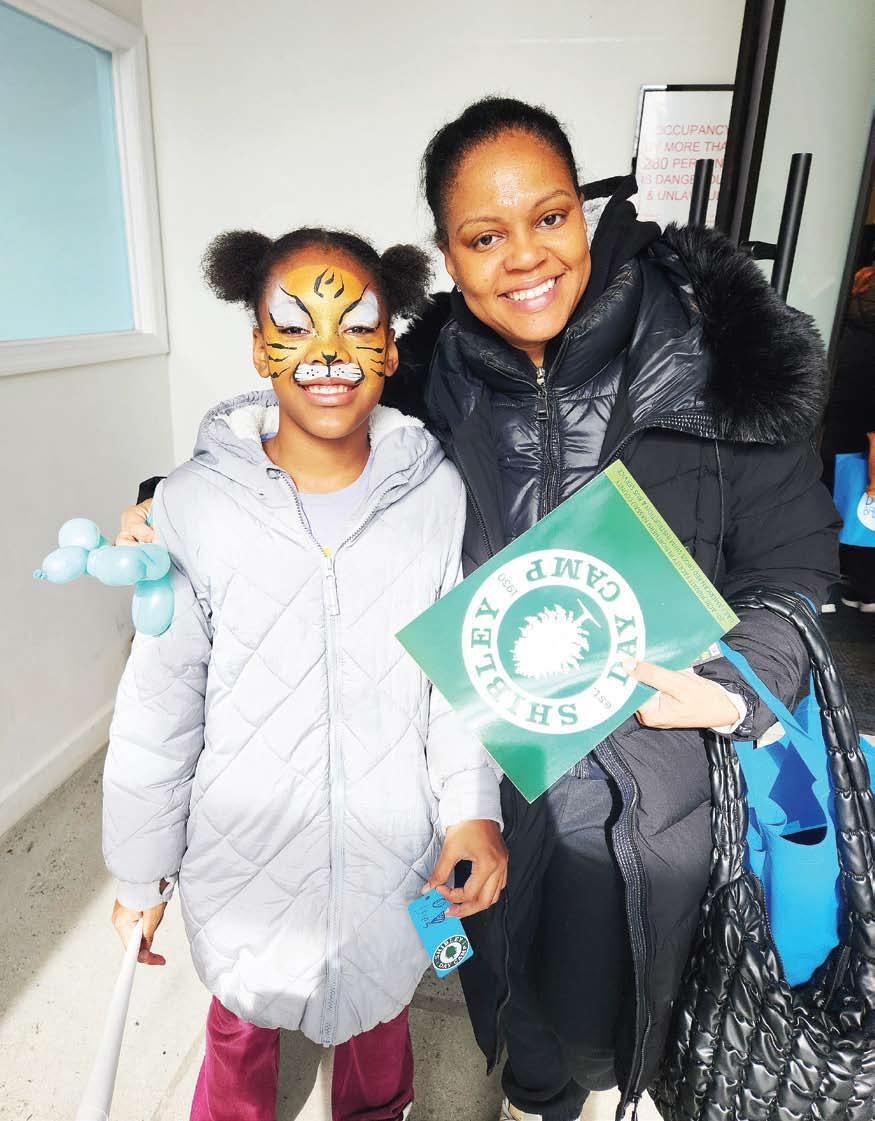
We hope all our awesome campers found amazing summer programs and camps at our fairs! Huge thanks to everyone who came out — you made it a blast. Miss the action? Don’t worry — check out the highlights from this year’s fair! We’re already dreaming up next year’s events… and trust us, they’re going to be even bigger and better! www.newyorkfamily.com What a Fair-tastic Time! Thank you to all of our 2025 Sponsors and Partners:



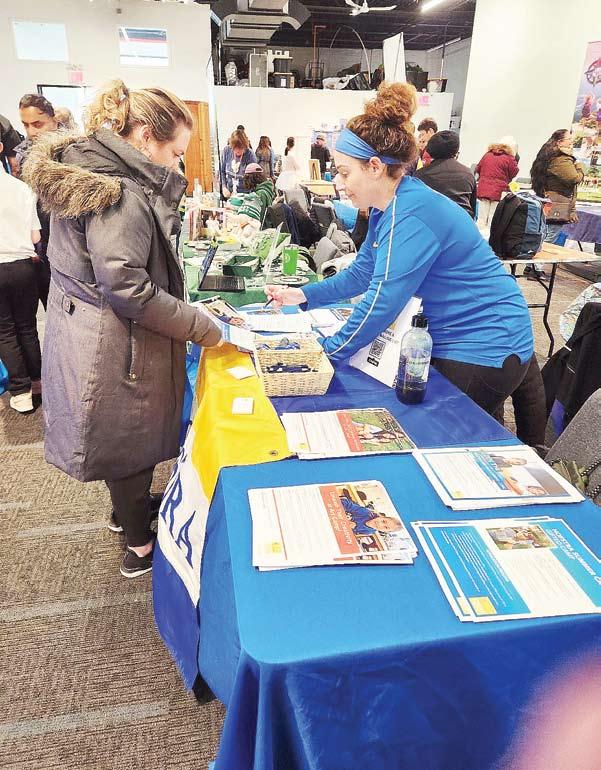


























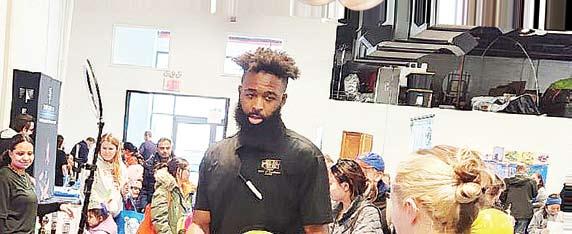




By shara Levine

apple blossom children’s carnival
wHen : May 3-11, Saturdays and Sundays, 11 am – 6 pm
wHere : Queens County Farm Museum, 75-50 Little Neck Parkway, Glen Oaks
ageS: All
wHaT: Merry Go Round in the orchard and celebrate the season with assorted carnival rides, midway games, local food vendors, and a visit with farm animals.
wanT To go?: $25-$50. (718) 347–3276, queensfarm.org
edwardian Mother’s Day Tea
wHen : Saturday, May 3, 1 – 4 pm
wHere : King Manor Museum, 150-03 Jamaica Ave., Jamaica ageS: All
wHaT: Enjoy a spot of tea and light refreshments as well as the opportunity to learn about 20th Century teas and participate in some of the games enjoyed at tea time.
wanT To go?: $5. (718) 206–
0545, kingmanor.org
viva el cinco De Mayo 2025
wHen : Sunday, May 4, 3 pm
wHere : Kupferberg Center for the Arts at Queens College, 153-49 Reeves Ave., Flushing ageS: All
wHaT: Experience the vibrant traditions of Mexican music and dance with lively rhythms, colorful costumes, and the rich cultural heritage of Mexico.
wanT To go?: $20. (718) 793–8080, kupferbergcenter. org
Jazz for kids
wHen : Sunday, May 4, 4 – 5 pm.
wHere : Culture Lab LIC, 5-25 46th Ave., Long Island City ageS: All
wHaT: Allegra and her all-star big band takes families on a sing along journey spanning bedtime and bath time to boogers and boo-boos!
wanT To go?: $25 per adult and child. culturelablic.org
Queens international children’s festival 2025

Queens county farm Museum hosts the a pple Blossom children’s carnival this month.
wHen : Saturday, May 17, 12 – 5 pm
wHere : Jamaica Performing Arts Center, 153-10 Jamaica Ave., Jamaica
ageS: All
wHaT: This day of live music, dance performances, games, arts and crafts, and more will inspire young people and families to enjoy the arts.
wanT To go?: Free. (718) 618–6170, jcal.org
forest Hills Memorial Day Parade
wHen : Sunday, May 25, 12 pm
wHere : American Legion Continental Post #1424, 107-15 Metropolitan Ave. Forest Hills ageS: All
wHaT: Join local and state wide community and civic groups to honor our fallen heroes.
wanT To go?: Free. americanlegionpost1424.com
Memorial Day craft and Storytime
wHen : Monday, May 26, 11 am – 1 pm
wHere : Queens Botanical Garden, 43-50 Main St., Flushing
ageS: All
wHaT: Join local children’s author Vandana Mathrani for a reading of her new book: Close Encounters in the Rainforest then take part in a special craft activity.
wanT To go?: Tickets start at $4. (718) 886–3800, queensbotanical.org
family Pajama Story
Time at the Queens Zoo
wHen : Friday, May 30, 5 – 8
pm
wHere : Queens Zoo, 53-51 111th St., Corona ageS: 2 and older
wHaT: Get cozy and experience animal encounters, craftmaking, and engaging stories at this fun after-hours event.
wanT To go?: $30; $24 member. queenszoo.com
Science in the woods
wHen : Saturday, May 31, 10:30 am – 12 pm
wHere : Alley Pond
Environmental Center, 229-10 Northern Blvd., Douglaston
ageS: 8 – 12
wHaT: Go on a hike to explore the forest ecosystem while learning about local plants and animals that make NYC Parks their home.
wanT To go?: Free. (718) 229–4000, alleypond.org
lic Springs!
wHen : Saturday, May 31, 12 – 5 pm
wHere : LIC Springs! Vernon Blvd. bet. 46th and 50th Ave., Long Island City
ageS: All
wHaT: This community street festival celebrates Long Island City with live performances, interactive lessons, art, fitness classes, outdoor dining, popup activities, games and more.
wanT To go?: Free. longislandcityqueens.com
Manhattan
Japan Parade and Street fair 2025
wHen : Saturday, May 10, 11 am – 5 pm










wHere : Parade begins at W 81st St. and Central Park West, Upper West Side
ageS: All
wHaT: Celebrate the friendship between the United States and Japan with floats, live performances, community organizations, local leaders, and more.
wanT To go?: Free. japanparadenyc.org
Dance Parade
wHen : Saturday, May 17, 12 – 7 pm
wHere : Parade begins at Broadway & 17th St., Union Square
ageS: All
wHaT: The annual event celebrates over 80 different styles of dance and continues with performances in the park and free dance classes.
wanT To go?: Free. danceparade.org
fleet week
wHen : May 23-26, Friday, 7 pm; Saturday-Monday, 10 am – 6 pm.
wHere : The Intrepid Sea, Air & Space Museum, Pier 86, Hell’s Kitchen
ageS: All
wHaT: Enjoy musical performances along with activities and demos from the military, including the U.S. Marine Corps, U.S. Coast Guard, Office of Naval Research and more!
wanT To go?: Free; additional events on The Intrepid included with
admission: $28-$38; free for children 4 and younger intrepidmuseum.org
Dinosaur Safari
wHen : Saturdays and Sundays, 10 am – 5:30 pm, Weekdays, 10 am – 5 pm through Nov. 2.
wHere : Bronx Zoo, 2300 Southern Blvd., Fordham ageS: All
wHaT: Get up close with some of the largest animals to ever walk the Earth, including more than 60 life-size animatronic dinosaurs, during this immersive walkthrough experience
wanT To go?: $38.95; $28.95 ages 3-12; free for children 2 and younger. bronxzoo.com
4th annual gjergj kastrioti Skenderbeu fair
wHen : Sunday, May 4, 12 – 6 pm
wHere : Crescent Ave. at Arthur Ave., Little Italy ageS: All
wHaT: Celebrate Albanian tradition and culture with music, dancing, performances, food, games and more.
wanT To go?: Free. bronxlittleitaly.com
wings over wave Hill
wHen : Sunday, May 18, 10 am – 5:30 pm
wHere : Wave Hill, 675 W 252nd St., Riverdale ageS: All


wHaT: Experience a full day of amazing bird encounters with demonstrations, handson activities, walks and presentations.
wanT To go?: Included with admission: $4-$10. (718) 549–3200, wavehill.org
celebrate Holi
wHen : Saturday, May 3, 10 am, 1 pm & 4 pm.
wHere : Brooklyn Children’s Museum, 145 Brooklyn Ave., Crown Heights ageS: All
wHaT: Enjoy a day of play featuring Bollywood dancing, colorful puppet shows, delicious treats, art-making, music, and more.
wanT To go?: $15. (718) 735–4400, brooklynkids.org
blippi: Join the band Tour
wHen : Sunday, May 4, 2 pm
wHere : Kings Theatre, 1027 Flatbush Ave., Flatbush ageS: All
wHaT: Join Blippi and Meekah as they explore what makes music, including sounds, rhythms and instruments, through all your favorite hits.
wanT To go?: Tickets start at $50. (718) 856–5464, kingstheatre.com
wHen : Saturday, May 17, 1:30 pm
wHere : Parade begins at 3rd Ave. and 85 St., Bay Ridge ageS: All
wHaT: The NorwegianAmerican 17th of May Parade celebrates independence and freedom with floats, performances, community groups, local leaders, first responders, and more.
wanT To go?: Free. 17thofmayparadecommitteebrooklyn.org


Summer in the Catskills of Sullivan County, New York, is where you’ll make forever memories. Walk an alpaca. Splash around in the Kartrite Resort and Indoor Waterpark. Sing out loud at a Bethel Woods Concert. Fish in a lake. Raft down the Delaware River. Camp out under the stars.
Our charming small towns have more things to see, do, and eat than summer has weekends!